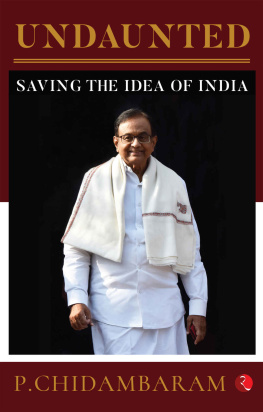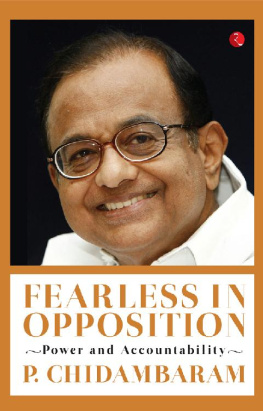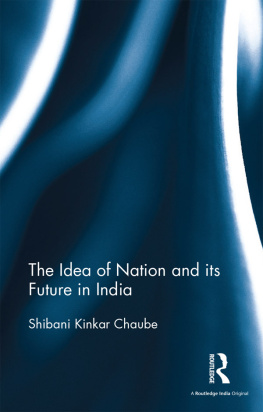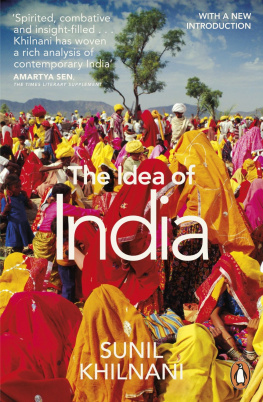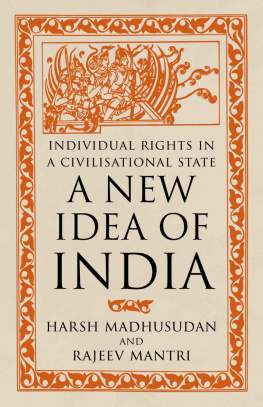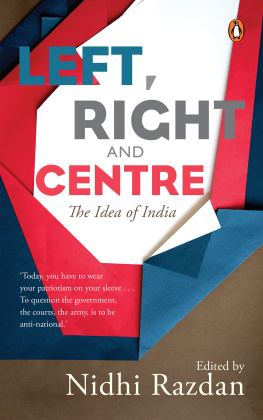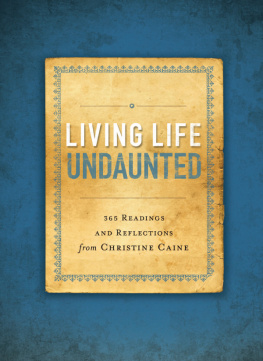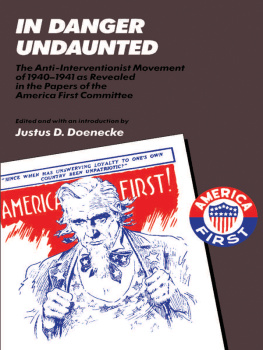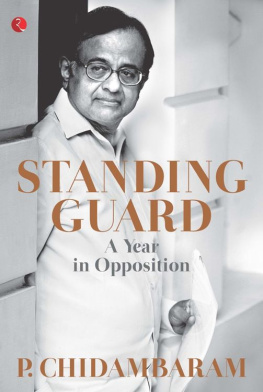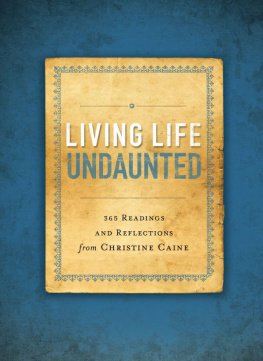P. Chidambaram - Undaunted: Saving the Idea of India
Here you can read online P. Chidambaram - Undaunted: Saving the Idea of India full text of the book (entire story) in english for free. Download pdf and epub, get meaning, cover and reviews about this ebook. year: 2019, publisher: Rupa Publications India, genre: Politics. Description of the work, (preface) as well as reviews are available. Best literature library LitArk.com created for fans of good reading and offers a wide selection of genres:
Romance novel
Science fiction
Adventure
Detective
Science
History
Home and family
Prose
Art
Politics
Computer
Non-fiction
Religion
Business
Children
Humor
Choose a favorite category and find really read worthwhile books. Enjoy immersion in the world of imagination, feel the emotions of the characters or learn something new for yourself, make an fascinating discovery.
- Book:Undaunted: Saving the Idea of India
- Author:
- Publisher:Rupa Publications India
- Genre:
- Year:2019
- Rating:3 / 5
- Favourites:Add to favourites
- Your mark:
- 60
- 1
- 2
- 3
- 4
- 5
Undaunted: Saving the Idea of India: summary, description and annotation
We offer to read an annotation, description, summary or preface (depends on what the author of the book "Undaunted: Saving the Idea of India" wrote himself). If you haven't found the necessary information about the book — write in the comments, we will try to find it.
Undaunted: Saving the Idea of India — read online for free the complete book (whole text) full work
Below is the text of the book, divided by pages. System saving the place of the last page read, allows you to conveniently read the book "Undaunted: Saving the Idea of India" online for free, without having to search again every time where you left off. Put a bookmark, and you can go to the page where you finished reading at any time.
Font size:
Interval:
Bookmark:
UNDAUNTED
Praise for the book
In this anthology, Chidambaram is at his incisive best as he debunks the Modi bluff, bluster and braggadocio. He is eminently qualified to do so as he has had a long and distinguished innings in public life and has been Union Minister for both Finance and Home. His writings have scholarly archival value as well.
Jairam Ramesh,
Member of Parliament and Former Union Minister
Chidambaram brings to bear a wealth of experience, mastery of the subject matter, a sharp mind and engaging writing style to comment on contemporary economic and political issues. You may not agree with him, but you cannot ignore him.
Duvvuri Subbarao,
Former Governor, Reserve Bank of India
Chidambarams essays cover some of Indias disadvantages, which have accumulated over the years, due to socio-economic realities. Besides being an active politician, he is very articulate and erudite in sociology, law and economics.
Ashok Ganguly,
Former Member of Parliament

Published by
Rupa Publications India Pvt. Ltd 2019
7/16, Ansari Road, Daryaganj
New Delhi 110002
Copyright P. Chidambaram 2019
The views and opinions expressed in this book are the authors own and the facts are as reported by him which have been verified to the extent possible, and the publishers are not in any way liable for the same.
All rights reserved.
No part of this publication may be reproduced, transmitted, or stored in a retrieval system, in any form or by any means, electronic, mechanical, photocopying, recording or otherwise, without the prior permission of the publisher.
ISBN: 978-93-533-3373-7
First impression 2019
10 9 8 7 6 5 4 3 2 1
The moral right of the author has been asserted.
This book is sold subject to the condition that it shall not, by way of trade or otherwise, be lent, resold, hired out, or otherwise circulated, without the publishers prior consent, in any form of binding or cover other than that in which it is published.
CONTENTS
BY M. HAMID ANSARI
FOREWORD
Shri Chidambaram is nothing if not consistent, focused and prolific. For four years now his weekly commentaries have made available to interested readers facts and analysis of facts that remain undisputed. Together, they constitute a compendium on the state of the nation. The present volume is timely because in the coming months the citizens of this polity would exercise one of the most fundamental of their democratic rights, the franchise, to pronounce upon the performance of the government.
In ages gone by, a powerful advocate of democracy had opined that citizens are fair judges of policy. This remains the standard by which to assess the pronouncements and performance of public leaders, whether they are statesmen or demagogues. This scrutiny has to go beyond the surface and explore the interstices and processes that led to individual acts of decision-making. It has to identify the gap between profession and practice and share it with the citizen body. Free societies over the world welcome it while those who view freedom differently deprecate it.
In times when criticism of state action is frowned upon, our author is undaunted. He has in these columns examined most aspects of our polity. An international journal of repute has this month enquired if India is faltering in its commitment to liberal, pluralistic, democratic order? The concern is serious and the quest for an answer would seem to lie firstly in our adherence to proclaimed principles and secondly to the efficacy of institutions.
What then is the score card?
There is no ambiguity about principles. These are inscribed in the Preamble and text of the ConstitutionJustice, Liberty, Equality and Fraternity. So every action violating these principles or condoning their violation is a contravention and many instances of both are cited in these essays. The same holds for the efficacy of institutions. These are instruments of governance. Are they being used or misused? While a decline has been in progress for some time, it has been aggravated in recent years. Instances are many. If the Budget is passed without scrutiny and debate by the Parliament; and if important pieces of legislation are endorsed without reference to standing committees or select committees, then it is evident that the Parliament as the designated legislative institution is not doing its duty and the government of the day is failing in its primary duty.
The same holds for several other institutions. Some have imploded, others have faltered on their essential functions. Still others have succumbed to backdoor control. Together they raise doubts in the public mind and undermine the confidence essential in a normal, open, system.
The author highlights the resulting situation and draws attention to the belief in impunity that seems to have infected every public functionary as a result of which every value of the Constitution is under attackfreedom, equality, liberalism, secularism, privacy, scientific temper, etc. He concludes that there is a clear and present danger that the Constitution of India will be replaced by a document that will be inspired by an ideology called Hindutva. This ideological deviation, conscious and unabashedly public, undermines the core values of the Constitution, differentiates between citizens on grounds of faith, seeks to impose a single cultural denominator to homogenize a plural society, and undermines secularism and the principle of fraternity.
The four essays on the situation in Jammu and Kashmir (J&K) make disturbing reading. From all available accounts, the muscular, militaristic policy has caused alienation particularly among the youth. The late Shri Vajpayee had suggested a solution within the ambit of humanity (insaniyat ke daere main). We seem to have opted instead for inhumanity, forgetting the old dictummight does not make right.
The essay on Searching for Shangrila on Indias place in the world should be read along with the Chilling Facts on Those Who Are Left Behind. This is perhaps the best commentary on the record of governance; this is how the world beyond our borders sees us.
Shri Chidambaram has done a public service by collecting these essays in this volume.
M. Hamid Ansari
14 January 2019
INTRODUCTION
When I resumed my column Across the Aisle in January 2015, I decided to write mainly on economic and social issues but also, I thought, occasionally on politics and foreign policy. I was apprehensive if I would be able to turn out an essay every Friday for publication on the following Sunday. I was also afraid that I would run out of subjects; that I will miss the deadline on many weeks; and that I may, in a short time, find the whole exercise burdensome and a chore.
If none of the above happened, I must thank Mr Narendra Modi and his government.
Although, initially, seven days in a week seemed too few, I found that the adrenalin would start flowing on Wednesday and, however busy I was, I would find the time to turn out a draft by Thursday. I was never at a loss for a subject. If economics did not throw up an issue, I turned to politics which provided an abundant supply of issues. And far from finding the exercise a chore, it turned out that the last four years have been the most challenging and eventful that I have spent as an Opposition politician.
My columns were less about what was happening in India and more about what was happening to India. And that is the conversation that I wish to have with you in this brief introduction to this book, or rather, this collection of columns written in 2018. They appeared in
Next pageFont size:
Interval:
Bookmark:
Similar books «Undaunted: Saving the Idea of India»
Look at similar books to Undaunted: Saving the Idea of India. We have selected literature similar in name and meaning in the hope of providing readers with more options to find new, interesting, not yet read works.
Discussion, reviews of the book Undaunted: Saving the Idea of India and just readers' own opinions. Leave your comments, write what you think about the work, its meaning or the main characters. Specify what exactly you liked and what you didn't like, and why you think so.

